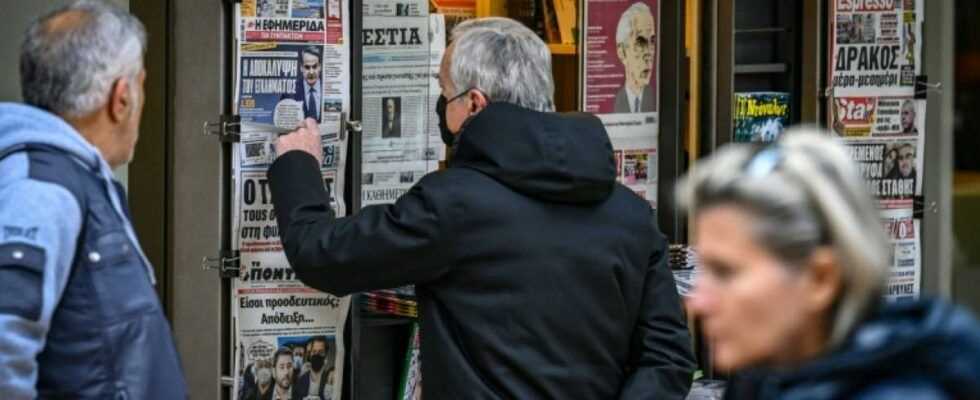People in front of a newsstand in Athens, December 16, 2021 (AFP / ARIS MESSINIS)
The murder this year of a journalist in Athens and the increase in attempts to intimidate journalists in Greece testify to a decline in press freedom in this EU country, worry experts and reporters interviewed by AFP.
In 2021, Greece lost five places on the world press ranking compiled by Reporters Without Borders (RSF), now in 70th place out of 180 countries, behind Poland and Mongolia.
“More than 130 cases of press freedom violations have been recorded in recent years,” George Pleios, professor of communication and media studies at the University of Athens, told AFP.
He mentions “obstacles” to covering events linked to the migration crisis, “intimidation” or detentions of journalists, and “police attacks” against photojournalists during demonstrations.

Greek Prime Minister Kyriakos Mitsotakis, December 16, 2021 in Brussels (POOL / Kenzo Tribouillard)
Last year, at least two women journalists had to resign publicly denouncing phenomena of “censorship” and “control” of the conservative government of Kyriakos Mitsotakis.
The executive replied that it “fully respects the independence of journalists”.
Fabien Perrier, French-speaking media correspondent in Greece, testifies to AFP with a letter of protest to the management of the daily Liberation on his article criticizing the work on the Acropolis site in Athens.
“I was criticized for my opinion and not for the facts,” laments this journalist, author of a biography of the former left-wing Prime Minister, Alexis Tsipras.
Last winter, when media reported, with photos, that the prime minister had twice violated containment rules, journalists received emails of protest from the government.
– Suspected “surveillance” –
At the beginning of November, a lively exchange in the middle of a press conference between Kyriakos Mitsotakis and a Dutch journalist made the buzz on social networks. She accused him of “lying” on the allegations of refoulements of migrants, which the government categorically denies.
This reporter, Ingeborg Beugel, said she then received “threats” before temporarily leaving the country.

People watch the headlines at a newsstand in Athens on December 16, 2021 (AFP / ARIS MESSINIS)
On November 13, the publication by the Greek daily Efsyn of documents from the Greek secret service attesting to the “surveillance” of a journalist provoked outrage from Greek and foreign journalists’ organizations.
This journalist, later hired by AFP, is the author of an article published in April on the Solomon site on a young migrant in detention.
In response to AFP, Minister of State George Gerapetritis denied “any surveillance of journalists”.
“Greece fully adheres to the values of a democratic society and the rule of law, in particular pluralism and freedom of the press,” he wrote.
– “Sacrosanct” independence –
In a second letter to AFP on Friday, the minister deemed the independence of the media “sacrosanct”.
“If we do not always adhere to what the media write, we defend (…) the right of a free press to work without hindrance and independent of any outside interference,” he said.
But no investigation has been opened into the veracity and leakage of the documents published by Efsyn.
“The government and pro-government media are trying to bury the case,” author Dimitris Terzis told AFP.
Very recently, a law providing for up to five years in prison for disinformation was castigated by RSF, which denounces “an attack on press freedom”.
– “The shadow of fear” –
In addition, Greece was shocked in April by the assassination of Giorgos Karaïvaz, 52, a judicial officer.
This is the second murder of a reporter in eleven years in Athens, after that of Sokratis Giolias, 37, in 2010, claimed by an extremist group.
In both cases, the perpetrators have not been identified.
RSF noted “the inadequacies of the measures taken by the authorities to protect reporters in the country”.
“This leaves the profession in the shadow of fear”, also believes George Pleios.
According to several experts, the worsening of the situation is due to the connivance between the media groups and the public authorities, against a background of politico-financial interests.
“The problematic relationship between the media and public power is not a new phenomenon”, underlines Lambrini Papadopoulou, professor in charge of the media at the University of Athens.
During the pandemic, state aid was “disproportionately” distributed to the media, the government being accused by the opposition of having favored the media close to it. A parliamentary inquiry is underway.
“The pandemic and the fall in advertising revenues have increased the media’s dependence on the state,” explains academic Maria Komninou.
Media analyst Georges Tzogopoulos also notes the “limited” propensity of certain media to “criticize the government’s management of the pandemic”, sometimes contenting itself with “copying and pasting ministerial press releases”.
hec / chv / mr / alc
